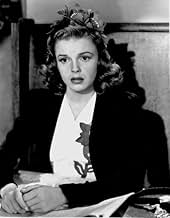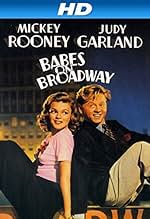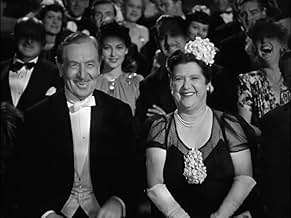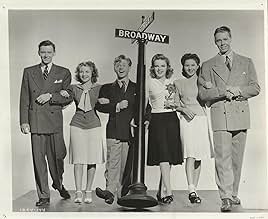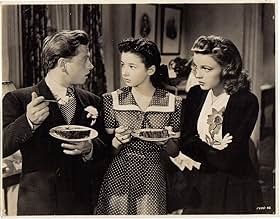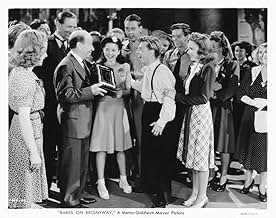Aggiungi una trama nella tua linguaPenny Morris and Tommy Williams are both starstruck young teens but nobody seems to give them any chance to perform. Instead, they decide to put up their own show to collect money for a summ... Leggi tuttoPenny Morris and Tommy Williams are both starstruck young teens but nobody seems to give them any chance to perform. Instead, they decide to put up their own show to collect money for a summer camp for the kids.Penny Morris and Tommy Williams are both starstruck young teens but nobody seems to give them any chance to perform. Instead, they decide to put up their own show to collect money for a summer camp for the kids.
- Regia
- Sceneggiatura
- Star
- Candidato a 1 Oscar
- 1 candidatura in totale
- Man
- (scene tagliate)
- Elinor Downing, War Refugee
- (non citato nei titoli originali)
- Butch
- (non citato nei titoli originali)
- Mrs. Crainen, the Matron
- (non citato nei titoli originali)
Recensioni in evidenza
Mickey is a member of a trio which also consists of Ray McDonald and Richard Quine singing for their supper at a one armed spaghetti joint owned by Luis Alberni. One of the three customers in the joint one night is Broadway girl Friday, Fay Bainter who loves the act and Mickey especially. She spends the rest of the film trying to get ulcer ridden producer James Gleason to hear him and the rest of the talent Rooney collects for that inevitable show he wants to put on.
Of course one of those talents is Judy Garland, another eager young hopeful and the musical highlight of the film is their singing the famous Vernon Duke song, How About You. It's not one of Berkeley's big production numbers, it's done with Mickey and Judy at a piano in her place, but their infectious enthusiasm will grab you immediately. How About You was later done in the fifties with a really fine arrangement by Rosemary Clooney and Bing Crosby in one of their joint albums.
The other highlight for me is the surreal number done when Judy and Mickey arrive at a long closed theater for their show and are transformed by the spirits of the performers of long ago who headlined in the place. What has to be remembered is that several of these people were actually still alive when Mickey and Judy are imitating them, people like George M. Cohan, Harry Lauder, Blanche Ring. Faye Templeton, Sarah Bernhardt, and Richard Mansfield were long dead or retired by then. Still people in the audience remembered them and Mickey and Judy's reverential treatment to these stage stars of long ago must have struck a chord in movie audiences we can't appreciate today.
The minstrel show finale of course isn't good, yet even that is salvaged somewhat by Judy's singing of Franklin D. Roosevelt Jones. She also recorded it for Decca and the number still plays well today. When Judy does it even in blackface, somehow instead of degrading, it comes out as a tribute, like Fred Astaire in blackface imitating Bill Robinson in Bojangles of Harlem.
My favorite of their joint projects has always been Girl Crazy, still Mickey and Judy are as alive and fresh in Babes on Broadway as ever and it's a great example of matchless chemistry and teamwork.
But it amuses me to see young commentators expressing "shock" and dismay at the blackface routines shown in the big finale. They never knew how popular minstrel shows were, even into the 1940s? Where have they have been living? They never heard of Al Jolson and how he rode to stardom on his blackface routines?
The film actually rises above its clichéd plot whenever Judy takes the spotlight with a song. Never has she looked so radiantly youthful and vibrant. Rooney, while of course obviously talented, tends to ham it up a bit too much whenever he's given the spotlight, which is a little too often for my taste. Fay Bainter does nicely as a patron of the arts while James Gleason gets on the nerves with his frustrated bit as a producer.
Amusing to see gangly RICHARD QUINE hoofing it up (before he became a film director). The standout dancer is Ray MacDonald, the fresh faced kid who lights up the screen whenever he dances, resembling, in style and acting technique, Donald O'Connor. Tragically he, like others in the cast, ended his life much too soon.
Judy and Mickey do a fabulous version of "How About You?" and Buby Berkeley's genius at staging intricate dance routines is nowhere more evident than in the "Hoe Down" number, probably one of the catchiest of all the musical routines.
There are slow spots and the film could easily have omitted footage to pare it down to a running time of, say, an hour and forty minutes. As it is, you have to be willing to stick with it for the full two hours, something only likely to occur if you're a true fan of Garland and Rooney.
You can catch a brief glimpse of two up and coming stars, Margaret O'Brien and Donna Reed. Reed has a brief moment as a receptionist.
Trivia note: Shirley Temple was originally considered for the Virginia Wiedler role. Might have been OK too, since the part is not that demanding musically and Temple could certainly still do the required amount of hoofing.
'Babes on Broadway' is my least favourite of their musicals ('Babes in Arms' had its problems but was a little better as an overall film regardless of its bowdlerised treatment of the musical), but Garland and Rooney and their chemistry are what saves the film. It works well as a musical, but fares problematically as an overall film, one can totally see the appeal but there are definitely understandable reasons as to why it won't click with others.
The story is very contrived and the sentimentality and corniness went well overboard in places. Was willing to forgive that it was structurally thin, the contrivances and problematic tone less so. There is some wartime patriotism which feels both out of place (tonally it feels odd with the rest of the film) and heavy-handed, and some of the editing is on the bloated side, some of it not serving much relevance to the story.
Unsurprisingly, the biggest criticism that 'Babes on Broadway' has gotten is regarding the "black-face" finale. Some of the criticism here has been over-the-top and I have seen plenty of classic period musicals to know that black-face routines were common at the time (it's very like being familiar with racial stereotypes in cartoons), still doesn't stop me not particularly caring for them. Wasn't offended as such here, but the finale did come over as overblown, rather tasteless and it has aged badly (even when judging it by 1941 standards and not by 2017 standards).
However, even when not in Technicolor, 'Babes on Broadway' still looks lovely in crisp black and white and with elegant production design. As said, on the musical front (production values, songs, vocal performance, arrangements, choreography and dancing) 'Babes on Broadway' fares significantly better. The songs are very pleasant and lively, "How Are You", "By the Light of the Silvery Moon" and "Hoe Down" faring best, "Chin Up, Cheerio" is enthusiastically performed but a bit patronising. The choreography mostly has energy and tenderness, really appreciated "Hoe Down's" intricacy.
Of the humour, Rooney's hilarious and pretty amazing impression of Carmen Miranda is a big standout. Garland does well too with her imitation of Sarah Bernhardt. Some nice fun wit and charm in the script, and Berkeley directs more than competently. 'Babes on Broadway' more often than not has a lot of energy and charm.
Fay Bainter, James Gleason and Donald Meek are very good in their roles (then again they could phone in a performance and still be good), and Margaret O'Brien is adorable in a short pre-fame appearance. Ray McDonald's dancing is pretty incredible. At the end of the day though it is Rooney and Garland that make 'Babes on Broadway' worth watching. Rooney clearly has fun, even if he does overdo it at times, while Garland, on radiant and touching form, is even better. Their chemistry is wonderful.
Overall, uneven film but Rooney and Garland delight hugely. 6/10 Bethany Cox
Lo sapevi?
- QuizVincente Minnelli conceived and supervised the "Ghost Theater" sequence where Garland and Rooney imitate theatrical notables of the past.
- BlooperWhen Alexander Woollcott is introducing the story, at one point his bow tie disappears and his collar is open.
- Citazioni
Maxine, Little Girl at Audition: Please wait, don't send my brother to the chair, don't let him burn, please, please warden, please.
- Versioni alternativeSome older television prints of the film delete the minstrel show finale.
- ConnessioniEdited into Hollywood: The Dream Factory (1972)
- Colonne sonoreBabes on Broadway
(uncredited)
Music by Burton Lane
Lyrics by E.Y. Harburg
Played and sung by a chorus during the opening credits
Reprised as a production number with the principal cast near the end
Sung and danced to by Judy Garland and Mickey Rooney in blackface
Danced to by Ray McDonald in blackface
I più visti
- How long is Babes on Broadway?Powered by Alexa
Dettagli
Botteghino
- Budget
- 940.068 USD (previsto)
- Tempo di esecuzione1 ora 58 minuti
- Colore
- Proporzioni
- 1.37 : 1
Contribuisci a questa pagina



